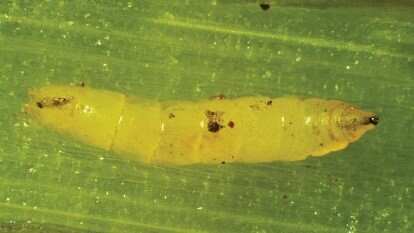CBP intercepts threats to U.S. agriculture
Jan 20, 2021U.S. Customs and Border Protection Agriculture Specialists (CBPAS) issued 171 emergency action notifications during the fourth quarter of 2020. Emergency Action Notifications (EAN) alert trade entities of non-compliance with APHIS regulations. The EAN provides options for phytosanitary actions that must be taken to prevent the entry of plant pests, prohibited plant products, or animal products capable of introducing foreign animal diseases.

CBPAS in Portal found Nysius, commonly known as a false chinch bug, within a shipment of screws from Taiwan. This type of seed bug is a pest that attacks wheat and other grains as well as vegetables. Due to the contamination, the container and contents were returned to Taiwan.
During an inspection of a rail container in International Falls, Minnesota, CBPAS intercepted Chloropidae (grass fly) in a shipment of flower pots from China. The grass fly is a pest that feed on the secretions around the eyes and nose of animals and humans. The grass fly is capable of spreading bacterial infections. The container was safeguarded until the threat could be mitigated.
CBPAS in Pembina discovered a shipment of Convention on International Trade in Endangered Species (CITES) protected plants including Ginseng and Dendrobium. The shipment was manifested as tea. The CITES shipment was missing documentation and is required to enter at specific locations listed on the paperwork. The shipment was returned to Canada.
“These agriculture seizures show the significant priority Customs and Border Protection places on our agriculture inspection program at our ports of entry,” said Pembina Area Port Director Jason Schmelz. “Preventing harm to domestic crops and vegetation is an important role our Agriculture Specialists provide this country.”
CBP Agriculture Specialists are the front line in the fight against the introduction of harmful insects and diseases into the U.S. They safeguard American agriculture by stopping plant pests and exotic foreign animal diseases that could harm vital agriculture resources at our nation’s borders.
Similar Stories

December 2024 U.S. Transportation Sector Unemployment (4.3%) Was the Same As the December 2023 Level (4.3%) And Above the Pre-Pandemic December 2019 Level (2.8%)
View ArticleDP World appoints Jason Haith as Vice President of Freight Forwarding for U.S. and Mexico
DP World, a global leader in logistics and supply chain solutions, has announced the appointment of Jason Haith as Vice President, Commercial Freight Forwarding – U.S. and Mexico, effective immediately.…
View Article
Amaero secures final approval for $23.5M loan from Export-Import Bank
View ArticleU.S. Bureau of Labor Statistics employment situation
Total nonfarm payroll employment increased by 256,000 in December, and the unemployment rate changed little at 4.1 percent, the U.S. Bureau of Labor Statistics reported today. Employment trended up in…
View ArticleImport Cargo to remain elevated in January
A potential strike at East Coast and Gulf Coast ports has been avoided with the announcement of a tentative labor agreement, but the nation’s major container ports have already seen…
View ArticleS&P Global: 2025 U.S. transportation infrastructure sector should see generally steady demand and growth
S&P Global Ratings today said it expects activity in the U.S. transportation sector will continue to normalize in 2025, with growth rates for most modes of transportation slowing to levels…
View ArticleGet the most up-to-date trending news!
SubscribeIndustry updates and weekly newsletter direct to your inbox!





